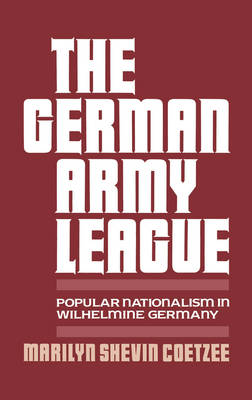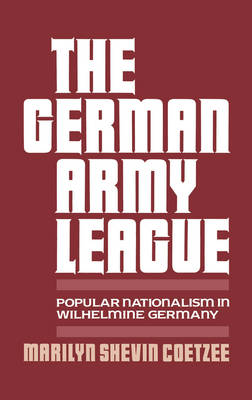
- Afhalen na 1 uur in een winkel met voorraad
- Gratis thuislevering in België vanaf € 30
- Ruim aanbod met 7 miljoen producten
- Afhalen na 1 uur in een winkel met voorraad
- Gratis thuislevering in België vanaf € 30
- Ruim aanbod met 7 miljoen producten
Zoeken
German Army League
Popular Nationalism in Wilhelmine Germany
Marilyn Shevin Coetzee
Hardcover | Engels
€ 288,45
+ 576 punten
Omschrijving
This book traces the development of the German Army League from its inception through the earliest days of the Weimar Republic. Founded in January 1912, the League promoted the intensification of German militarism and the cultivation of German nationalism. As the last and second largest of the patriotic societies to emerge after 1890, the League led the campaign for army expansion in 1912 and 1913, and against the growing influence of socialism and pacifism within Germany. Attempting to harness popular and nationalist sentiment against the government's foreign and domestic policies by preying on Germans' fears of defeat and socialism, the League contributed to the polarization of German society and aggravated the international tensions which culminated in the Great War. Coetzee combines an analysis of the League's principal personalities and policies with an exploration of the inner workings of local and regional branches, arguing that rather than having served solely as a barometer of populist nationalist sentiment, the League also reflected the machinations of men of education and prominence who believed that an unresponsive German government had stifled their own careers, dealt ineffectually with the prospect of domestic unrest, and squandered the nation's military superiority over its European rivals.
Specificaties
Betrokkenen
- Auteur(s):
- Uitgeverij:
Inhoud
- Aantal bladzijden:
- 192
- Taal:
- Engels
Eigenschappen
- Productcode (EAN):
- 9780195061093
- Verschijningsdatum:
- 28/06/1990
- Uitvoering:
- Hardcover
- Formaat:
- Genaaid
- Afmetingen:
- 157 mm x 238 mm
- Gewicht:
- 494 g

Alleen bij Standaard Boekhandel
+ 576 punten op je klantenkaart van Standaard Boekhandel
Beoordelingen
We publiceren alleen reviews die voldoen aan de voorwaarden voor reviews. Bekijk onze voorwaarden voor reviews.







